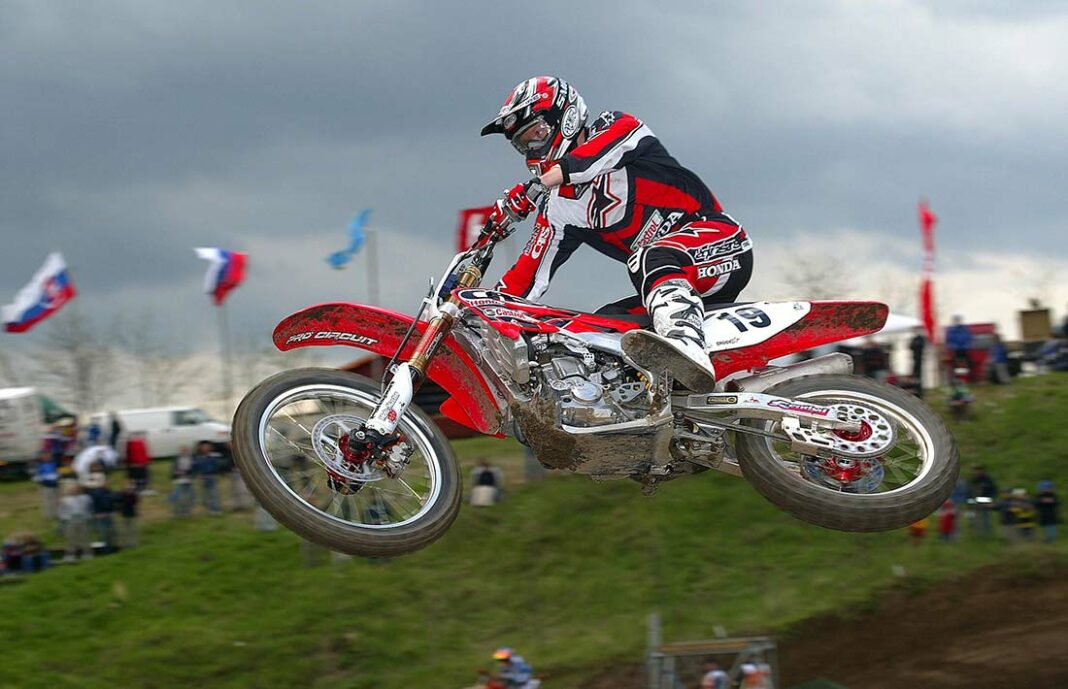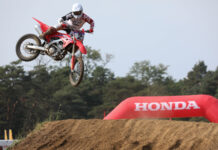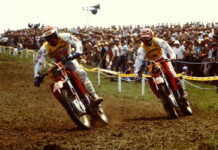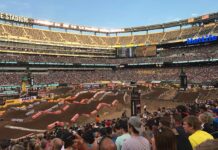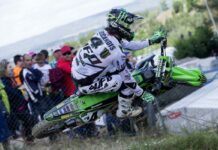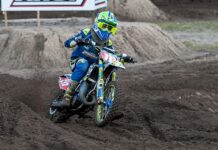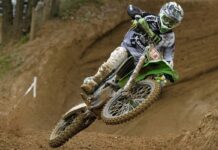Ireland’s greatest ever motocross racer, Gordon Crockard won four GPs and three British titles but fell just short of the ultimate prize. We caught up with the 37-year-old to find out about the rapid redhead’s rise, fall and new career in movies…
Less than 10 minutes into our conversation Gordon Crockard tells me something that pretty much stops me in my tracks.
“It was absolutely always about winning,” he states in his soft Ulster accent. “It was always for that. Even as I was coming through anything other than a win was just a step towards winning. Getting fifths, fourths, thirds meant I was getting closer to winning. Once I was winning then that for me was really what it was all about.”

Maybe I shouldn’t be shocked. After all, he did an awful lot of winning – four grand prix overalls, three British championships, countless more British championship races – but in my head I’ve always seen him as a man who was simply in love with riding motorcycles. Good-time Gordy, every bit as happy bog-hopping with his mates in Ireland or winning local trials as he was stood on top of a Spanish GP podium.
But when he starts to talk at length about his rise and inevitable fall it becomes clear that there’s much more to him than the happy-go-lucky, always grinning Gordy that made him one of the most popular riders of the modern generation.
Of course, I’ve always known he was fiercely competitive. That was crystal clear the first time I saw him race in ’96 and the many, many times I watched him in action afterwards. But even on the previous occasions I’ve interviewed him I didn’t realise just how driven he was and this time around there’s an air of melancholy and regret when he reflects on what was, what wasn’t and what might have been.
He doesn’t admit it – but he doesn’t completely deny it either…
“I wouldn’t say I’m down about it, I would say that I got so close and it feels a wee bit like I didn’t just go far enough.
“I didn’t win the world championship, I didn’t even finish second – I got third – and that sucks. I’m not bitter, I’m not walking around thinking ‘that was a failure’ but a little part of me does think that. I got so close but didn’t win. I wasn’t good enough, that’s the bottom line. [Mickael] Pichon was better. He was faster than me.”
This was, of course, in 2001 when he won GPs in Belgium and Sweden and lost second in the world to Chad Reed in the final moto of the season.
“I used to joke with Kurt Nicoll that he was so pissed off all the time because he finished second so many times in the world championship. I told him if he’d won it once he’d probably be chilled out and relaxed. I used to take the piss out of him for that and I suppose I’ve learned not to be like that.
“I won world championship races, I didn’t win the championship but I can’t complain, I can’t look back on the ifs and buts and maybes. That’s just how it was. I tried plenty of times but it never happened.
“It’s the old story. I could look back and try and find reasons why but at the end of the day my best years were 2000 and 2001 on the 250cc two-strokes – I was nearly there but I didn’t win the world championship – and then I made a mistake and went with KTM in ’02.”
Moving to the Austrian manufacturer was a pivotal moment for Gordy but we’re getting ahead of ourselves and we’ll come back to that later. First let’s turn the clock back 37 years and discover the roots of his passion for motocross.
“My dad stopped racing in ’78 – the year I was born – but my mum and dad continued to follow the sport. Our summer holidays were loading up the camper van and heading over to watch British championships, British Grands Prix, Namur, Luxembourg, Dutch Grands Prix. Summer holidays would have been away in the camper van watching motocross.

“I had a BMX and I used to ride around with my dad’s gear on and think I was a motocrosser. He purposely didn’t get me a bike, he didn’t want me to have a bike too soon and he always brought up examples of David Watson and different guys who didn’t have bikes until they were maybe 12 or 13.”
Gordy’s dad Davy was a multi-time Irish champion who had firm views on his son’s progression in motocross.
“He didn’t like the idea of automatics so I got a bike when I was nine and the size to ride a 60. He actually got himself a bike as well – an ’84 Yamaha 250 – and started riding again at the same time and we rented a field off a farmer near the house. We went out on our bikes every Saturday and in the summer we would have rode in the evening and it was just totally and utterly sport.
“My dad’s attitude was that there was no point in me going racing if I couldn’t beat him. The deal was that if I were to be faster than him then he would take me racing. By this stage I was on an RM80 because it took me three years to get good enough to beat him. I would have been 12.
“So he sold his bike and took me racing. I won my first race – it was a grasstrack at Comber – but whenever I went to motocross I wasn’t winning, I would’ve been third or fourth.”
It was only a matter of time before Gordy’s talent started to shine through and once the wins began to come he quickly realised he liked the feeling.
“It wasn’t until I got into the adults at the age of 16 that I really started to show a bit of flair. So I could ride a bike but I wasn’t really interested in racing – I couldn’t see what all the fuss was about.
“I don’t think I was aware of the benefits and the feeling of glory of winning. I don’t think I understood the pride and dignity. It’s a very satisfying emotion. When you win races you can carry your head high and that can last for days and I just don’t think I knew what that was.
“Once I started racing against men it became really exciting. I got a real sense of potential and people would talk to me with real encouragement and support me and whenever I saw that I realised that I was making an impression. Whenever I rode fast and won races people really noticed it and would compliment me on it and I realised it was a really good thing.”
Gordy’s potential certainly was being noticed – even if not all of his fans were keen to come forward.
“Success brings a lot of advantages. I had an anonymous tyre sponsor. I’d go to school and when I got home there would be tyres left at the porch door. This went on for weeks. It wasn’t until the last race of the season that a man came up and introduced himself. He said ‘my name’s Robin Lowe and I’ve been buying you tyres all year, it’s been a joy watching you race’.”
In 1995 he was riding a 125cc Yamaha in youth races as well as the adult Grade B Semi-Expert class in the Irish and Ulster championship. With his first adult title secured he was allowed to move up to the Grade A class for the final race of the season.

“I was riding a 250 that day which I’d borrowed from Stephen Russell. I had been selected to ride the Coupe de l’Avenir in Belgium and I figured that if was going to be any way competitive I needed to be on a 250.
“So I rode the 250 at the last round of the Ulster championship at Bell’s Hill. It was the Tommy Stewart Memorial and Alan Morrison came out of retirement every year to ride it and every year he won it – he pi*sed all over everyone and made them all look stupid every year. It was awful.”
Morrison, an Irish motocross hero who won the 1990 British 125 GP, was very much the man to beat and Gordy did just that.
“I was riding in Grade B but for the last race they let me ride in the Grade A race and I caught Alan and passed him and won. That made me think that I could win the premier class in Ireland.
“So the next year I focussed on riding in Ireland in the Irish and Ulster championships on a 250 and won them both. My dad’s attitude was what’s the point in going to race in England if you can’t win here.”
I first met Gordy at Lyng in ’96 when I gave him a copy of a TMX front page he’d featured on a few weeks before thanks to a cracking photo taken by Pete Plummer.
“The picture that Pete took was from the Andrew Chambers Memorial race at Desertmartin. Some English riders had come across – Neil Prince, Denis Hewartson, Ed Bradley, those sorts of guys – which was great for me because it gave me a chance to race against British championship riders and I could gauge what sort of level I was at.
“We’d been to the des Nations at Jerez in Spain and we were on our way back and there was a week between the des Nations and the Coupe de l’Avenir and that week was when the last British championship was on at Lyng. I came and rode the support class and I think I won it and then we went over and did the Coupe de l’Avenir.”

By this point he was working as a mechanic at Russell’s Motorcycles who also sponsored him for his first year in the British championship in ’97 when he finished seventh with his season highlight a podium at Hawkstone Park. The following year he made a major career move by signing for the fledgling CAS Honda team.
“In ’98 I turned professional. Roger Harvey had been pushing quite hard for me to ride Hondas in ’97 but I wanted to stay with Yamaha. Andy Smith from Yamaha kept on matching whatever he was offering and then Roger said ‘what’s it going to take?’ and I said I would like to live in England because I thought it would really help. So he came back with sponsorship of the rental of a house – that was Harry Ainsworth.
“I’d met him not knowing it at a clubman’s race at Toddington in ’96. We were running long rod kits in the Yamaha and Harry came over to ask how it was going and I think I made an impression on him because I really went into detail and I think it helped him out. His late son Scott was riding Yams at the time and he had a long rod kit.”
It was the start of a relationship that would see Gordy win GPs and British championships but would ultimately end in acrimony and legal proceedings.
“We rode grands prix and we rode British championship and grands prix was a big problem for me. They went from 40 riders on the line to only 30 and I couldn’t qualify. I had real difficulties. It became a really upsetting situation. I had made a lot of changes in my life – I’d moved away from home, I’d left my job, I wasn’t riding Yamahas and the ’98 Honda wasn’t brilliant, it had that rigid frame. I got quite down and sad and I didn’t want to ride bikes.
“I didn’t jack it in but I came home and reverted back to riding at smaller races – I didn’t want to ride grands prix – and put a lot of things that were upsetting me right, got the motorbike working and started to make small steps towards feeling positive again.”
Motocross is much more than simply going out and twisting the throttle. The bike’s got to be good, the rider’s got to be fit and, just as importantly, his head’s got to be in the right place. Ainsworth understood this and gave his new signing the space he needed.
“I returned to grands prix at the end of the year – just my dad and I – and started to qualify. Harry was very good to me in that he allowed me to do what I wanted. He always gave me that and that was a massive help.
“I explained the problems I was having and what I thought were the solutions and he supported me. So when I came back to grand prix racing I did it my way. I have to thank him for that – I wouldn’t have made it if I hadn’t been allowed to do it the way I wanted.

“I came back for the Belgian Grand Prix at Mol in August and I qualified. It was very, very deep sand and I knew that the race was being televised live on Eurosport. I holeshot and led the first lap and when we came back around I went down the start straight fist-pumping and looking across at myself on the big screen. I was so happy I wanted everyone to see.
“We kept qualifying and we turned it around. Harry stuck with me which again is something I am really grateful for. I gave him lots of opportunities to be sacked.”
There were no points in a debut GP season that ended dramatically when Stefan Everts crashed in Greece and handed the 250cc title to Sebastien Tortelli but the writing was on the wall – Gordon Crockard was someone to watch. He further underlined his potential with a stunning performance at the U21 MXdN and carried his momentum into the ’99 season.
“I went to the Coupe de l’Avenir and I won it. That was a real important thing for me. It was important that I believed in myself and you need results.
“In ’99 Neil Prince came to the team and he brought Nick Moores with him. We went and rode grands prix and we qualified and finished the year in 13th in the world and fourth in the British championship, winning all three races at Farleigh. I was a bit more mature towards the end and understood myself better.”
The breakthrough came in Y2K with GP wins at the season opener in Spain, another in Belgium, sixth in the world and the British Open title.
“The 2000 season was good for me. I won Talavera – my first grand prix win – but I wasn’t on the podium again until Kester which was July. I remember thinking it was really important to be back on the podium because I didn’t want to be the guy who won one grand prix and was never seen again.
“I didn’t want to be that guy – I felt that I had the ability to be on the podium and Kester was an important part of the year for me. The rest of the year ended quite good for me. I had a series of podiums and I was getting a lot of seconds and thirds, I was going really good and I was very happy.
“My main thing that year was to try and win the British championship. It all goes back to the end of ’99 when the British championship went to Farleigh Castle and I won all three races. It was the last round of the championship and that set me up for the winter with a real inspiration to try and win the British championship.
“I really believed in myself so I did a lot of preparation, a lot of training and really focussed on what I was doing. I had Nick Moores with me for the first time and Rob Herring as a team-mate and it went very, very well.”

The season started badly for the team when Herring broke his wrist on the first day of pre-season training in America but Gordy’s relationship with Moores was solid and the pair formed a formidable partnership.
“Having Nick with me was very positive. He was able to give me a bike I really loved and Rob was a huge hero of mine and I really looked up to him and took a lot of inspiration from him. I thought 2000 was going to be the year I won the British championship and I just concentrated really hard on doing that.
“Paul Cooper was my main challenger and all of that effort to be British champion made me good enough to win at world level. I was really surprised when I won at Talavera but I just kept focussed on trying to win the British championship.
“The last run of races were brilliant for me and I ended up sixth in the world championship which was fantastic. I was so pleased. And I won the British championship as well and had a great Motocross des Nations.”
There was a radical shake-up of GPs in 2001 with the introduction of a one-moto format which Gordy doesn’t feel suited him – despite the fact he had the best season of his career.
“In the year 2000 it was two times 45-minute races and I had an advantage over the other guys. We all got tired but when I got tired I didn’t slow down and my riding style had a lot to do with that. In those long races whenever we had two of them in the one day I liked that. It was good for me. I was fit. Being fit is easy, you just apply yourself. It doesn’t take any talent or ability – you just have to train. So I liked it whenever it was a big physical challenge.
“In 2001 there was a lot of pre-season talk about how the one-moto format was going to shake everything up and what people were doing for their physical preparation and there was a lot of speculation about who was going to be good.”
The world championship didn’t get off to a great start for Gordy at the series opener in Spain after he took some well-meant but ill-informed advice.
“Going into the first GP in Bellpuig, something Stephen Russell said to me sticks in my mind, that I needed to be going to the line with beads of sweat on my forehead and pumped up and ready for this one moto. And I bought into this.

“I was leading the race and I remember getting so nervous and I got massive arm-pump as well because I had myself so hyped up and so in a tizzy that everything mattered for this one moto that I ended up crashing and I think I finished seventh or something.”
A fortnight later at round two in Holland he decided to do his own thing and it paid off.
“I used to sleep a lot on race day and I did that at Valkenswaard. I got up before the race and I was yawning in the parc ferme – it was on Eurosport – but I holeshot and ended up finishing second. I remember thinking that all this talk of being hyped up didn’t matter – it was about being fast and getting the bike around the track.
“So I didn’t change my preparation, I just looked at it that I needed to be as fast as I possibly could be and I needed to be fit enough to last the race.”
He retained his British Open title in ’01 but the world championship was dominated by Pichon. The Frenchman won 10 of the 14 rounds and while Gordy won in Belgium and Sweden he finished on the podium just two more times. He was second heading into the final race of the year in Austria where Reed – in his final GP before moving to the US and attaining superstar status – pushed him back to third.
Then came the decision that possibly altered Gordy’s entire career trajectory.
“In 2002 I rode a KTM. I took a calculated gamble at the end of 2001. I felt that I needed to make a change. I was competing against Pichon on a factory Suzuki, Chad Reed at the time was on a factory Kawasaki, Bolley was on a factory Honda and I had Nick Moores who was modifying standard bikes. We were trying to win the world championship on a modified production bike.
“I had three offers – KTM, Kawasaki and Suzuki factory bikes – and I went with KTM. At the time KTM had focussed on 125s and had dominated, they’d focussed on the Open class and won and they were telling me that the focus was now on the 250 class.
“I thought with what they’d achieved in those other categories it was going to work and it didn’t work. It was a lost year.”
With 2001 125cc world champion Jamie Dobb as his team-mate, Gordy went into the season as a contender but was never a real threat and ended the year seventh with his best result a second in Austria.
At home he was still a contender but he missed out on a hat-trick of British titles.

“In 2002 I paid for everything to do with the British championship out of my own pocket. I didn’t have a deal with KTM Austria to ride it and KTM UK didn’t offer me any assistance but I did it because I wanted to be British champion.
“I actually feel that the championship was robbed off me that year. At Culham, on the first lap of the first race, a stone came off David Campbell’s back wheel and smashed right through my goggles and broke my nose so I was in hospital for the rest of the day. I didn’t score any points and that was three races.
“At that moment I was leading the British championship and went from that to being miles behind. Then at Pontrilas the gearbox broke on my KTM and I had a DNF and that put me totally and utterly out of it.
“Those two things, if they hadn’t happened I think I would have been British champion.”
For 2003 he went back to CAS Honda and onto a 450cc four-stroke and dominated at home.
“I won so many races that I was able to afford to sit out the round at Lyng because my shoulder had been dislocated at Valkenswaard the weekend before.”
But on a world level he struggled in the new MXGP class and despite a couple of podiums he was never a threat, ending the year in 11th.
“They’d changed the format and combined the classes – [Joel] Smets and [Stefan] Everts and [Marnicq] Bervoets were all in the class and it just got even harder. There were lots of little injuries – a broken finger, a broken arm – but my shoulder was the big one, I had a separated AC joint. I just had a series of injuries which made it hard to be a contender.”
He was reunited with Moores the following season but after initial promise 2004 was over very quickly for Gordy.
“Nick came back from the KTM factory and he joined me again at CAS after much, much persuasion and pre-season practising and testing in California had been going brilliant.

“Stefan Everts was dominating the races at the Hawkstone International and something happened to me in the first race – I think my exhaust broke – and I ended up coming into the pits. I rejoined behind Everts and rode round behind him for the rest of the race which proved to me that I was fit and fast and that the bike was working well.
“The next race I did was Canada Heights which was a complete mudbath. I had no goggles and was riding like a maniac, put my foot into a rut and it totally rotated and dislocated my knee and wrecked it. I went home and saw a surgeon and the ACL was torn and the cartilage was torn.”
Gordy still travelled to Zolder the following weekend for the first GP of the year and qualified but the torn cartilage in his knee kept locking his leg. Faced with no choice but surgery, he was out for more than four months.
“In that time the British championship was gone, the world championship was gone and I also had a big fall-out with the CAS team. I came back and rode the remainder of the year but that entire season was a big negative. The fall-out with CAS was very, very difficult with so many good years together and such great memories.”
A move to Yamaha with Steve Dixon followed in ’05 but his season was marred by a broken wrist and a lack of confidence in his Ohlins suspension before things improved in ’06 with Roger Magee’s Honda team. And there was yet another change of team in ’07 when he rode for PAR Honda and showed good form in the British championship and at GPs but something was missing.
“All the time I was trying to get back into that area of winning world championship races but if you’re not even on the pace then you can’t win the races and you’re definitely not going to win the world championship. It all did go downhill from the minute I got injured in ’04.
“At the end of ’07 I took interest in enduro and I knew BMW were putting together a factory team to go world enduro racing and someone suggested I should speak to them.”
It would be his sixth team in seven years on four different marques and this time it was a totally different sport.
“I ended up racing in America in the GNCC. I went away from motocross completely and to be honest it was all about money. The deal with Roger in ’06 was that I got £100-per-point in the world championship and I scored 176 points – that was my income, not profit and I had to get to all the races so I didn’t make anything at all in ’06 and I got to the end of ’07 and thought ‘what am I doing with my career?’. I had bills to pay and needed to make money.

“BMW offered me a two-year deal and it was 80 grand a year. It was a no-brainer so away I went. On paper I was a good trials rider and a good motocross racer and generally I was an endurance man – long grand prix races suited me. So I was excited and motivated and I put my heart into it.”
To say Gordy and his team boss Scott Summers didn’t see eye-to-eye is a massive understatement and the problems were compounded by a lack of bikes.
At the time BMW also owned Husqvarna and with the opening round looming Gordy was told to fly to the US where there was a Husky waiting for him for the first round in Florida at the start of March.
“We were totally disorganised and absolutely unprepared. The bikes were standard, didn’t even have big tanks – it was a total joke of a set-up.”
To make matters worse ongoing visa problems meant Gordy wasn’t getting paid and when his visa eventually came through – two-thirds of the way into the series – and he finally got his money he left.
“The whole project failed. It was a disaster. They never got BMW bikes and it was an absolute nightmare. That was an incredible disappointment for me. I had gone away from motocross, I had moved to America and given up so much and been so excited about this new direction my career was going in.
“My performances on that bike weren’t good enough for any of the teams over there to take an interest in me. And I also discovered I don’t really like racing in the woods. I wasn’t passionate about it. That particular style of racing, I didn’t feel that comfortable, I felt quite dangerous because I didn’t know what was coming next.
“I came back in the summer of ’08 and Paul Rowlands immediately offered me sponsorship and I rode for Paul and had some good races. I really enjoyed it.”

Back with PAR for 2009 alongside Brad Anderson, Gordy was involved in an horrific start straight crash at the Hawkstone International that almost proved fatal.
“That was immediately the end of that season and potentially the end of my racing career. I suffered grave injuries. I had five broken ribs, five broken vertebrae, a broken collarbone, a smashed spleen and I almost died.”
Amazingly, he came back to finish the season but – inevitably – coming so close to death was playing on his mind.
“I was really tentative – I didn’t know how I was going to feel in a race – and as it turned out I was fine riding the bike but at the start of some races going into the first corner I found I was nervous and I didn’t welcome that.
“As hard as I tried to think about it logically I just couldn’t get that to go away. It’s understandable and I’m not embarrassed by that – I don’t think I was a pussy – it was just because what I went through.”
A one-off ride at the world indoor enduro round in Sheffield at the end of the year resulted in a chance meeting with Leo Cordingley who had worked with David Knight that season in the EWC. Cordingley suggested Gordy might like to try racing world enduro and a meeting was set up as Paul Bird’s workshops.
The EWC deal never came off but, instead, Gordy ended up winning that year’s British SX title on Bird’s hybrid machine – a KX250 two-stroke engine in a 250F aluminium frame – which led to a 450 ride outdoors in 2010.
“I was fit and strong and what was lovely about that year was each time I got a good result it was like ‘that was fantastic after the injuries you had’ so where I felt before that I had this downward slippery slope of not getting the results I used to get and jumping from team to team, after the accident each time I rode well it was applauded.
“The label of ‘Gordon Crockard, British champion, grand prix winner, third in the world’ seemed to have removed and it was now this ‘near death survivor’ tag and that was really refreshing.
“People spoke to me in a very different way and I didn’t feel that I was on a campaign to save my career. Prior to this crash it was almost like I was trying to keep the career going and cling on to who I was, in 2010 it was like a blank page and all that history was total put away.
“It was a fresh start and I got good results and it felt like this weight of pressure had been removed. In the British championship I think I was lying fourth, I won a couple of rounds of the Red Bull Pro Nationals and we almost went grand prix racing to replace Jonathan Barragan.”
A ride with the Irish-based TAS Suzuki team alongside Mel Pocock followed in 2011 but Gordy failed to gel with the bike and at the end of the season he flew Down Under where he raced for Craig Anderson’s team in the Australian SX championship.
“Craig and I got along brilliant. His team was good and he liked me riding for him. I was holding off on doing anything because I hoped we could put a deal together and I could ride the nationals in Australia in 2012.
“It didn’t happen straight away. Craig was riding himself but he wanted to retire so he called me up and asked me if I wanted to go over so I rode some of the nationals, then they had a break in the series so I came back to the UK. The hope was Craig could rally up some sponsorship money to pay for me to go back over and ride out the rest of the year but he couldn’t.”

Having left things so late there was no deal in the UK so Gordy was riding a 450 Kawasaki supplied by Norman Watt Motorcycles in local races.
“Then I got an opportunity from Steve James at LPE Kawasaki and it worked out well and I had some decent results. I was trying to get a job as a full-time member of the team in 2013 but it didn’t happen.”
And that was, sadly, that – after 16 years of contesting the British championship race fans haven’t seen him compete at that level since, although there was a last-minute call-up to Team Ireland for the 2014 MXdN.
“I ride the bikes a lot but I don’t compete anymore on any professional level. I feel that I’ve done enough racing in my time and I just don’t get it anymore. I’m not motivated to race. I achieved way more than I ever wanted to and I don’t have that desire to chase after championships and race wins.
“I certainly don’t have anything to prove to myself. I’ve sort of done all that.”

Declining fortunes – On the way down…
“After you’re a champion the only way you’re going is down. You either keep winning which is very hard to do because my motivation dropped once I had won the championship. It just feels harder to keep pushing – you’re not chasing after something, you already know what it feels like.
“You finish second, third, fourth and fifth and start coming down. Those later years that I raced on, you have an expectation because you’ve won before and anything other than a win seems a failure.
“Even in 2010 when I was riding for Paul Bird on a Kawasaki I won some races and instead of people congratulating me and saying ‘you rode brilliant, you were the best’ they’d say ‘it’s great to see you riding like we know you can’. It made me feel like asking what they thought I was doing the rest of the time. Did they think I was not trying?
“I took a really funny angle on it all and I just felt this constant expectation that because I’d won before I should always win. Well you can’t do that, especially if you lose motivation because you don’t invest in yourself, you don’t take the risks, go practising or testing. You just don’t get stuck in like your life depends on it.”
Gordy’s goals – He shoots, he scores…
“I inherited my dad’s attitude. He always said ‘what are you on the line for, what’s the objective of starting this race?’ and it was to win it. That was it. It was about winning.
“The first year I went to the British championship we were realistic – I wasn’t sitting on the line at Canada Heights at round one in 1997 thinking that I was there to win the race but it was the start of a goal, I had to work in steps.
“It was a case of we’d go for three years and if I hadn’t got it won in three years I was never going to do it and that was the way we always looked at it. It was the same in Ulster championships, in Irish championships so I had short-term goals and long-term goals.”
Achilles heel – Start aches
“The ultimate is to be world champion and I proved on a number of occasions that I was in that area but a few things let me down throughout my whole career, mainly my starts.
“If I got the holeshot or started top three or even top five in every GP I did I wonder how many races I would have won and I wonder how many world championships I would have won. That’s the raw fact of it – any time I got a good start at a grand prix I either won the race or finished on the podium.
“Something as simple as making good starts or not making could starts could have been the difference in me winning a world championship or two or three world championships.
“You just wonder because it’s life-changing being world champion and finishing second or third, nobody remembers. Nobody knows. You’ve got to win, that’s the bottom line.
“In a British championship if I made a bad start I could still recover but the competition was too strong in a grand prix. It’s a wee bit of a thing that sticks with me.
“I tried everything to fix it. It reminds me of golf actually. I can’t play – I’m not a golfer – but sometimes you can hit a ball and it goes exactly where you want it and then you do the same thing expecting the same results and you slice it into the trees. I never got to the bottom of it.
“I never qualified well which was another thing I had to address. When I grew up all my preparation was for racing – not a one-lap flier – and that was the way I designed my riding style. Everything was focussed on being a good racer and that came into my calculations – I thought maybe I’m not getting good starts because of where I qualified so I worked on being good at qualifying and learned how to do it. And it didn’t really make much difference.”
Van-sanity! – Booze, bikes and burn-outs…
“It was Farleigh Castle and I think it was ’99 and it was Neil Prince’s van and I think Neil’s 125. We were coming back from the pub to the paddock – we were celebrating so I started the bike up and did a burn-out in the back of the van. It nearly killed us – burning tyre and two-stroke fumes.”
VMXdN – Retro redhead
“The VMXdN is something that I do enjoy and when I go there I totally enjoy the event. I went there for a few years as a potential race winner and I won some races and ran right up at the front.
“I find myself getting caught up in the competitive side of that and trying to win the races and I very quickly realised that that just makes me frustrated. The nature of that event, it’s kind of tricky with the bike because some people don’t conform completely to the spirit of the event to run original pre-89 bikes. They may be running a bike that looks pre-89 but they’ve got modern suspension and modern brakes and that started to frustrate me a little bit.
“I was getting so competitive just with trying to win races there and this year I rode a 125 and that took me out of that completely and I actually enjoyed it more because I wasn’t under pressure to win the races or run at the front.”



